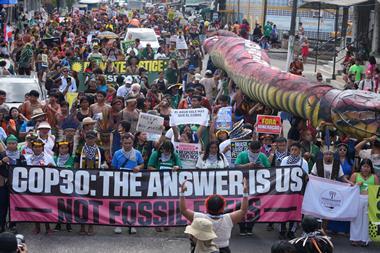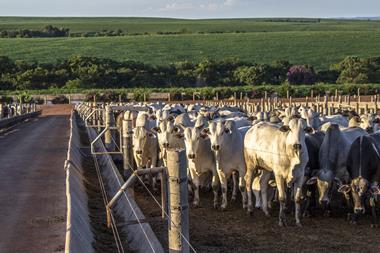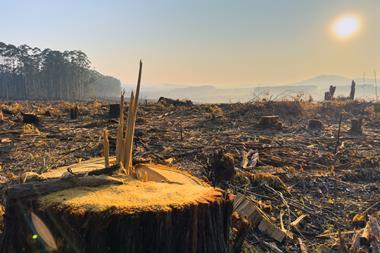
The UK needs to “strengthen its adaptation objectives” for global temperatures to exceed 2°C above pre-industrial levels by 2050, and is currently underprepared for such an eventuality, the independent Climate Change Committee has warned.
Adaptation was “both essential and urgent”, said the CCC in a letter sent to Defra minister Emma Hardy this week, with preparation for a 2°C in temperatures described as a “minimum”, rather than the widely-accepted target of 1.5°C.
But in a world where “climate change is increasingly driving extreme weather events” – with England having just experienced its second-worst harvest on record, according to Defra data published earlier this month – Committee chair Baroness Brown of Cambridge warned the UK was lagging behind on action to mitigate such challenges.
“It is clear we are not yet adapted for the changes in weather and climate that we are living with today, let alone those that are expected over coming decades,” she warned, responding to an earlier call from Hardy for advice on the same topic.
“Faster rates of warming between now and 2050 remain possible, with additional warming beyond 2050 currently expected,” said Brown. And at the “high end of possibilities”, reaching 4°C above pre-industrial levels by the end ofthe century “cannot yet be ruled out”.
Governments had “repeatedly failed on their ambitions to make the UK resilient to climate change, Brown pointed out, as she called on the ministers to set a framework “of clear long-term objectives”, driven through a set of interim milestones.
Read more: Eat-Lancet calls for major reduction in meat consumption
Key challenges for such a framework included ensuring the UK’s food security was preserved with “key goals for environmental improvement and support for nature delivered, despite a changing climate”, the CCC said.
“The people of this country are already experiencing the impacts of a changing climate, and we owe it to them to prepare, and to help them prepare, for what we know is ahead,” she urged.
“It is important that the government and bodies like ours continue to use scientific, factual analysis as the basis for our respective decision making and advice,” she added.
Her comments come amid mounting and significant evidence of backsliding on global climate initiatives, from US president Donald Trump’s anti-sustainability agenda, to the EU’s delay to its Deforestation Regulation and New Zealand’s adoption of watered-down methane reduction targets this week.
Meanwhile, campaign group Net Zero Network+ published a report this week warning the UK food sector needed radical transformation on a scale not seen since the Second World War, if it were to avoid lurching between myriad crises, from food price shocks, to climate disasters and weakening economic productivity.
It comes as a new report, published this week by sustainability consultants Leafr, revealed corporate CSR delivery had dropped sharply, with just under nine in 10 (89%) of corporate sustainability teams “doubting their ability to meet short and long-term sustainability goals”.
Drawing on comment from more than 450 sustainability professionals across UK and European companies, the report, titled ’The True State of Sustainability’, warned of a “widening gap” as businesses faced new ESG disclosure requirements under the EU’s Corporate Sustainability Reporting Directive (CSRD) and UK Green Claims Code.
How sustainability efforts in the food industry are going up in flames
The research also revealed that 76% of respondents reported their team was “not adequately resourced”, with 67% saying their team was smaller than it was last year and 62% pointing to budget constraints as a key barrier to progress.
Sustainability teams “cannot deliver net zero on their own”, said Gus Bartholomew, co-founder of Leafr.
“They are under-resourced, pulled in too many directions, and forced into compliance work at the expense of impact. Unless leadership, regulators and investors align behind a pragmatic model that values environmental outcomes as much as financial ones, targets will remain out of reach.”
Responding to the report, Mike Barry, co-founder of campaign group Planeatary Alliance, said many companies had retained their public sustainability targets – despite a global ESG backlash – “but seem to be soft-pedalling on their delivery”.
“The public holding of the sustainability targets line has been important and should not be underestimated in the current political climate,” he added. “But the worry grows that the truly transformative action we need to respond to the conjoined and growing social and environmental crises is still stalled at the start line.”



















1 Readers' comment